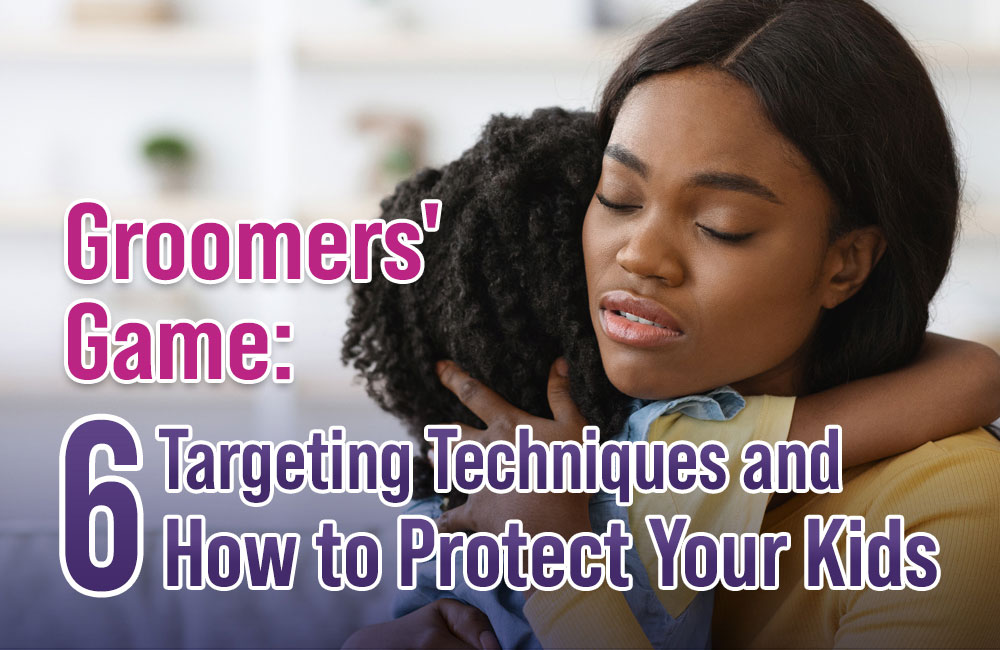Groomers’ Game: 6 Targeting Techniques and How to Protect Your Kids
Grooming.
It’s everywhere. At school, in stores, in our entertainment, in public libraries, and in government. Sex traffickers have enslaved more than two million in the commercial sex business. Even more are used as laborers and for organ harvesting – bringing the number well over five million. 1
It also happens personally with predators even in our own communities. It’s an ugly topic that has become impossible to ignore.
Before we get into this, may I offer one important caution?
There’s a fine line between causing paranoia in our children – and instilling habits to keep them safe and secure. This topic can raise the blood pressure of any mom, so it’s important to be intentional and strategic in how we use this information to protect the ones we love.
How can you spot a pedophile? You can’t tell by looking – it could be a neighbor, teacher, coach, or a complete stranger.
What we can point to is how they often operate. Many have honed skills of deceiving and luring young ones into their deviant trap. Grooming is how they carefully prepare the child to become a victim through a series of steps.
Protect your sons and daughters with awareness of these tried-and-true pedophile practices. Here are six steps often used to victimize children and ways to protect yours before it happens.
Grooming Step 1: Sizing Up the Victim
Sexual predators select a young person using a number of variables. It could be a particular attraction or a child they perceive as an easy target. It could be someone they access through online interaction. Once they have someone to pursue, they often begin sizing up the victim. In our connected society, facts and information about children and teens can be found online through social media. A review of a 13-year-old’s Instagram feed can provide a wealth of information about what they like, who they follow, and their primary interests.
This easy investigation arms the abuser with valuable topics of interest to engage the child. Suppose they are into horses. Suddenly there’s a connection when he tells the child he also loves horses. Then he can plant the idea of going riding sometime. Any interest, music artist, movie fandom, or comic book series can be used to create what the young person may think is a coincidental common interest.
BEFORE that happens: Have open conversations with your child about this topic. If they are very young, your discussion of these dangers may be more limited; however, let them know that they can always talk to you about anything or anyone!
Teach them to use caution with online relationships. It’s a hotbed for predators, and it can be hard for a child to discern whether the person they are speaking with during an online game is a 12-year-old girl, as they presented themselves, or a 52-year-old man. Use extreme caution in your family’s online practices. Finally, open communication lines between you and your children (best created before a crisis) can protect significantly from these sorts of predators.
Grooming Step 2: Earning the Victim’s Trust
Skilled at building relationships with kids, these abusers can make connections seem natural. They may take notice of a child who seems like a loner and begins to pay special attention to them – speaking with them, encouraging conversation, and listening intently as the youth shares concerns or struggles. Becoming a confidant who “cares” and offers encouraging guidance is a common way abusers can imbed themselves in a child’s life.
BEFORE that happens: Make sure your child has people within your immediate family to confide in. Depending on the family dynamic, this can include grandparents, mom, dad, and siblings. Know who your child confides in and help build a support system.
Since abuse has happened in many trusted institutions like churches, the Boy Scouts, and even among extended family, you must be vigilant. If your child hints that they are uncomfortable around someone – even in your family – take that seriously and always give your child the benefit of the doubt. A secure home life can be a bulwark against predators.
Grooming Step 3: Meeting the Victim’s Need (Or That of Their Family)
Suppose the abuser has learned that the child they are interested in is struggling in math and offers to tutor them for free? That provides a welcome service that mom appreciates, given how expensive tutoring can be. In a way, he’s also grooming the parents – gaining trust all around.
Maybe the child would love to go to a certain movie – or local amusement park – the predator may purchase tickets and offer to take the child. That could again be two birds with one stone – the mom has an afternoon free while her child gets to do something special that maybe she didn’t have the budget for. Meanwhile, the abuser becomes more trusted and enmeshed in the family dynamic.
BEFORE that happens: It’s a shame that someone who wants to do something nice for you or your child must be suspect, but often you are the only one with the discernment necessary to stand between your children and disaster.
Use caution when you allow your child to be alone with someone you don’t know well. Additionally, when it’s an extended family member, troop leader, or church leader – who pays over-enthusiastic attention to one of your children, your mom-senses must be on alert. It may be completely innocent, and hopefully, it is. Still, you must judge what’s happening between your child and this person.
Michelle Peterson tells her story on our most recent podcast of her teenage son, who was pursued by a teacher who sent thousands of lewd texts and sexual requests. Hear how her son was targeted and how she fought back – and won.
Grooming Step 4: Isolating the Victim and Secret-Keeping
By now, the predator is trusted and seems to care deeply for the family and the child. Increasingly, abusers groom their victims by isolating them, planning activities and outings with just the two of them. Because he has gained the approval of mom and/or dad, the youngster may have their guard down, too. The abuser may seem like someone who truly cares about them and is interested in spending time together.
Another aspect of this isolation can be when a predator increases online contact with the victim, texting, messaging, and more. Constant communication can develop closeness to the abuser as the relationship grows from frequent, fun outings to ongoing contact all day– and even into the night.
This can be when the groomer discerns the victim’s willingness to keep secrets. Perhaps a sum of money or an expensive gift is given to the child, and the abuser cautions them not to tell their parents because it might upset them. It’s a test of whether their victim will readily keep secrets from their parents or if they will require more practice in this area.
BEFORE that happens: Early in life, your child should be taught that ANYONE who asks them to keep a secret from you is up to no good – the only exceptions being holiday gifts.
Raise your kids with a healthy fear of anyone who asks them to hold secrets from you. Teach them that unless you know what’s happening, you can’t protect them – and if someone ever asks them to keep information from you, they are not a friend.
Teach them that this is red-flag behavior and that they must immediately tell you of anyone engaging in this divisive practice. It could be a teacher asking for gender lessons to be hidden (an entirely different kind of predator), a relative, a close family friend, or that kind man who’s been helping tutor your child in science.
Grooming Step 5: Sexual Contact with the Victim
When the sexual overtures begin, often it starts with an inappropriate touch that the abuser may even claim was an accident – to see how the victim responds. There might be play wrestling that involves brushing up against private parts or a physicality that begins to take on a closeness that hasn’t happened until now. They may show the child some pornography. The abuser is seeking to desensitize the child to sexual images and touch.
Eventually, the touching escalates, and there is some form of sexual contact. Regardless of how far it goes – any sexual interaction between an adult and a child is evil and a criminal offense.
The victim is confused by the abuser, who may use guilt, fear, or intimidation to force the child to keep the secret. Thus, the abuse can become an ongoing trauma. The adult may convince the child that if they tell their parents, they’ll both get in trouble since they viewed pornography. He may even convince the child that it was their fault that he did the act to them. It sounds outlandish that a child would believe that, but remember, this young person is a victim of trauma which affects the mind and body. They often feel guilt and shame that they “participated” in this. These feelings are augmented by their molester’s accusations.
BEFORE that happens: Have ongoing conversations throughout their childhood about inappropriate touching and boundaries. Ensure they know that even a trusted adult, neighbor, teacher, or relative may not touch certain areas of their body and that they should immediately tell you if anyone does.
Instill that you will always be ready to help them escape if they are scared, or something happens. You will believe them over any adult. As they get older, make sure they understand how to maintain boundaries – teens may have many situations where you won’t be as available to them. They need to know that you will help them if they ever encounter difficult or inappropriate situations.
Talking about these dangers in advance can help remove the teeth of shame and secrecy. When they are old enough to grasp it – let them know that a child is never at fault when an adult attempts inappropriate sexual touch or activity.
Note: I’ve referred to the predator as “he” and “him” throughout this blog – but it’s worth noting that pedophiles can be either male or female.
Grooming Step 6: Maintain Control Over Victim
The abuser who has power over the child, holding them captive emotionally, convincing them that they mustn’t ever tell, wants to remain in that position. They may insist they love the victim as a sort of emotional blackmail play. Another way to maintain control over victims is to use threats or violence. The molester may hurt the child physically or promise to kill their parents if they share the secret. Or they may use the guilt and shame of it all to convince their victim that no one will believe them.
BEFORE that happens: Know your child’s daily routines and who they spend time with. If an adult is spending an excessive amount of time with your child, be sure to investigate.
If your child’s demeanor changes – they seem sad, depressed or have changed eating or sleeping habits, don’t let that pass without considering that something isn’t right in their world. Even teens who often have some moodiness, if things seem off to you, don’t ignore your mom-instincts. You might rescue them from a disastrous fate.
What if it’s already happened?
Take heart if you’ve discovered a situation where your child suffered abuse on one or more occasions. You have rescued them. Seek guidance from a counselor and know that there is hope ahead. Countless women and men have recovered from sexual abuse and have grown into healthy adults, with healing from God and from skilled and compassionate professional counseling.
Please don’t blame yourself because some abusive criminal wormed his way into your life. It’s not your fault. Ensure any perpetrator is reported to authorities to protect future victims and look forward to a healing journey with a hopeful and positive future for your young person. God can restore and heal any hurt.
Grooming is on the rise, and it’s no longer a secret. Mamas, you can safeguard your children, and you must. There’s a fine line between staying safe – and creating paranoia in your child, so be careful not to teach your child that everyone they meet is unsafe but help them develop safe habits and discernment.
As I mentioned at the beginning – this is an ugly topic. Still, we must safeguard our little ones in our current cultural climate. You are equipped for this through wisdom, prayer, and your God-given discernment as a mom.
1 Tim Ballard, CEO,Operation Underground Railroad, Interview on Dinesh D’Souza Podcast – youtube.com
***




